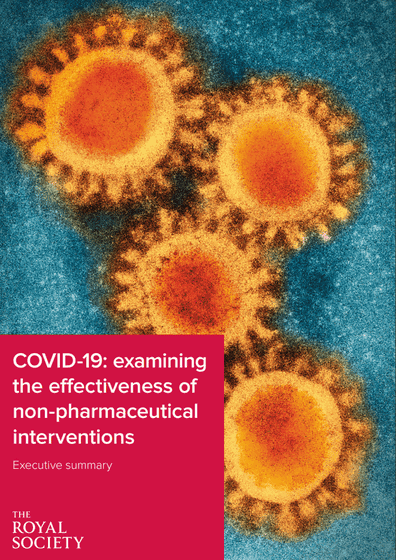Report that lockdown, mask wearing, and maintenance of social distance clearly reduced the spread of new coronavirus infection

The UK's Royal Society has released a report titled ' COVID-19: Examining the effectiveness of non-pharmaceutical interventions,' highlighting the importance of social distancing and wearing masks during the coronavirus pandemic. They report that measures such as wearing masks clearly reduce the spread of infection.
COVID-19: examining the effectiveness of non-pharmaceutical interventions
(PDF file) https://royalsociety.org/-/media/policy/projects/impact-non-pharmaceutical-interventions-on-covid-19-transmission/covid-19-examining-the-effectiveness-of-non- pharmaceutical-interventions-executive-summary.pdf

Lockdowns and face masks 'unequivocally' cut spread of Covid, report finds | Coronavirus | The Guardian
https://www.theguardian.com/world/2023/aug/24/lockdowns-face-masks-unequivocally-cut-spread-covid-study-finds
The report focuses on non-pharmaceutical interventions (rather than drugs or vaccines) that apply a range of non-pharmaceutical measures, such as masks and face coverings, social distancing, lockdowns, testing, tracing and isolation, travel restrictions, environmental controls, and communication. NPI) is a compilation of six expert-led reviews that examined thousands of research papers published in a variety of countries and regions.
When each NPI was evaluated individually, there was limited but positive evidence as to whether it led to a reduction in infections. It was shown that combining each NPI led to a greater reduction in infection. It was also shown that NPIs are most effective when the infection has not progressed to that point, and the Royal Society supports the idea that NPIs should be used thoroughly during the early stages of a pandemic and the earliest stages of a resurgence. I think it is.
According to the Royal Society, the most effective NPIs were 'social distancing' and 'lockdown,' with physical distancing through curfews and restrictions on large gatherings. It has been shown to be associated with a significant reduction in coronavirus infections.

Furthermore, the wearing of face masks and mandatory measures have been shown to be an effective approach to reducing infection. High-quality masks, especially N95 masks, were also found to be more effective than common surgical masks. Additionally, countries that have evaluated test-trace-isolate measures and implemented high levels of contact tracing have shown a decline in deaths from COVID-19.
Professor Christopher Dye from the University of Oxford said: 'We are preparing for the next pandemic caused by what the World Health Organization (WHO) calls Disease X. We don't know what Disease X is, and we don't know where it will start. 'Therefore, we need a versatile system that can handle any type of disease, and I think building a system that can be monitored on a global scale should be a top priority.'
Professor Ikrystor Donnelly, Head of the Department of Applied Statistics at the University of Oxford, said: 'We don't know what will be implemented in the future, and we don't know whether it will be implemented in the future, but the impact of what has happened with the coronavirus pandemic is significant. It is possible to characterize it, which will help in future decision-making, and of course we will need to collect more data in future pandemics.'

Related Posts:
in Science, Posted by log1i_yk







